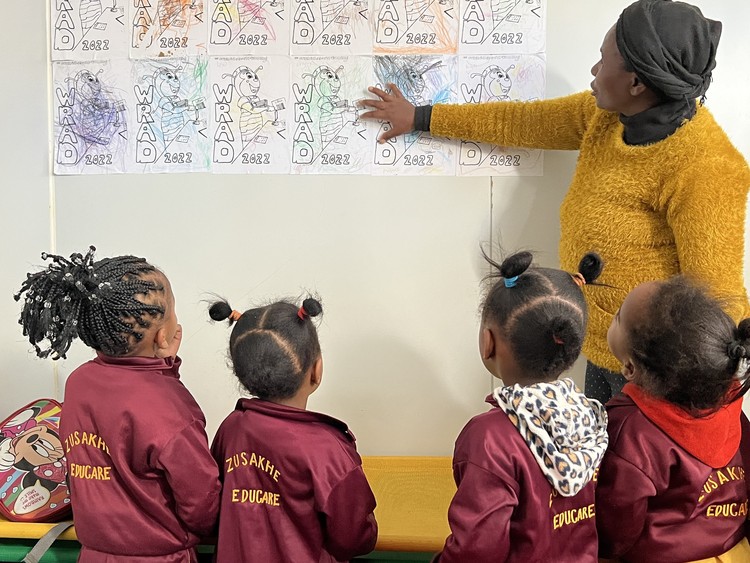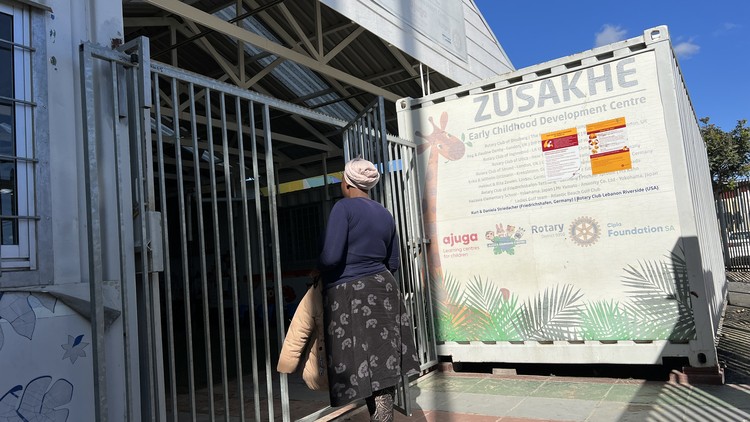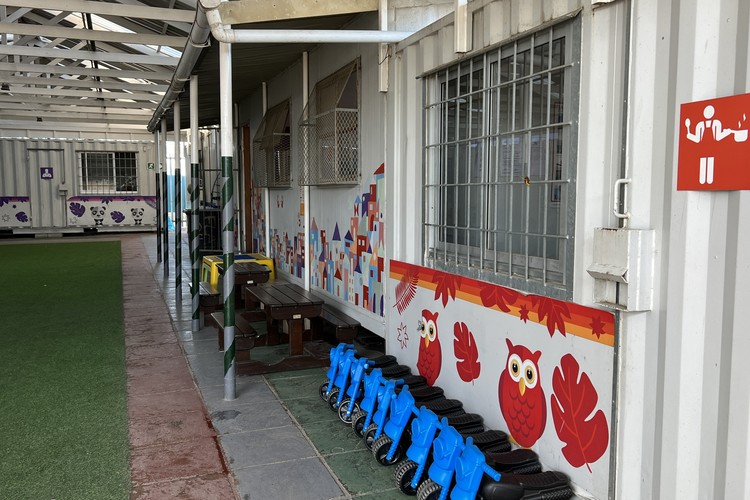More than 60 crèches in Dunoon struggle to register for funding
Ward councillor asks education department to help crèches become compliant rather than shutting them down
Teacher Noluthando Isaac with some of the toddlers in her class at Zusakhe Educare in Dunoon, Cape Town. This is the only Early Childhood Development (ECD) centre in the community that has successfully registered with the education department. Photos: Peter Luhanga
- Only one of the Early Childhood Development (ECD) centres in Dunoon, Cape Town is formally registered. The other crèches in community are not, and therefore can’t get government subsidies.
- Many crèches in poor communities struggle to meet the basic criteria because of costs.
- The chair of the ECD Forum says crèches are overcrowded because Dunoon itself is overcrowded.
Only one of the Early Childhood Development (ECD) centres in Dunoon, Cape Town is formally registered, says Councillor Meisie Makuwa. This means they are not eligible for state funding.
To register with the Department of Education, centres have to meet requirements set out by the state. These include environmental health clearance, fire clearance, and land use zoning.
But many crèches in poor communities struggle to meet these basic criteria.
Makuwa said after a community meeting earlier this month she had tried to access state funding for the centres but had been told that they were not registered and could not be assisted. She pleaded with officials to help the crèches become compliant.
The owners of an unregistered crèche, who asked not to be named, told GroundUp that she started operating in 2000 from a shipping container in front of her house. The woman said she had seen parents in her street leave their infants with other young children at home while they went to look for work opportunities.
She said she is a qualified educator and currently has 30 children in the centre aged three to five. Attempts to register her crèche have been unsuccessful because he has not been able to get the space around the shipping container rezoned, and because there is not enough outdoor space for the toddlers to play in terms of health and safety requirements and municipal bylaws.
She said many parents could not afford to pay crèche fees each month and compliance with the requirements was expensive.
“When authorities send a delegation to inspect [the creche] they point out all the wrongs and say we must do these things right, but why can’t they fund us to do the things we need? We need tables, blankets, mattresses,” she said.
A parent collects a child from Zusakhe educare in Dunoon.
The chairperson of Dunoon Early Childhood Development Forum, Phumeza Ntsantsa, says there are 60 crèches affiliated to the forum which are not registered. Ntsantsa, who is qualified in early childhood development, also runs a creche and has been trying to register it for 12 years.
Ntsantsa said she had been told to decrease the number of children at her facility from 58 to 35 in order to register and be compliant.
“What must I do with the rest of the children? Our crèches are overcrowded because we don’t have enough space because Dunoon itself is overpopulated.” In some crèches in Dunoon up to 100 children are taught in a shack or in a single room in an RDP house. The crèches charge between R350 to R550 a month and parents who are unemployed struggle to pay this amount.
The only registered creche, Zusakhe Educare, is run by a non-profit company which has other programmes and which gets funds from big corporates.
Western Cape Education Department spokesperson Bronagh Hammond told GroundUp that there were potential risks to children and staff if crèches did not adhere to the health and safety requirements or to the municipality’s bylaws.
“All crèches need to register and follow the registration process that has compliance aspects as stated in the Children’s Act,” she said. These include environmental health clearance, fire clearance, and land use zoning. The education department only issues certificates once it has inspected the centre’s compliance, Hammond said.
When asked about the Dunoon councillor’s request for help, Hammond said the department would follow up. “Our aim is to educate centres about the requirements for registration and health and safety,” she said.
Fcilities at Zusakhe educare which other centres in Dunoon say they can’t afford.
Support independent journalism
Donate using Payfast

Next: Education department investigates abuse allegations against Pretoria school
Previous: Emalahleni is failing to provide clean drinking water to 500,000 people
© 2022 GroundUp. This article is licensed under a Creative Commons Attribution-NoDerivatives 4.0 International License.
You may republish this article, so long as you credit the authors and GroundUp, and do not change the text. Please include a link back to the original article.
We put an invisible pixel in the article so that we can count traffic to republishers. All analytics tools are solely on our servers. We do not give our logs to any third party. Logs are deleted after two weeks. We do not use any IP address identifying information except to count regional traffic. We are solely interested in counting hits, not tracking users. If you republish, please do not delete the invisible pixel.



